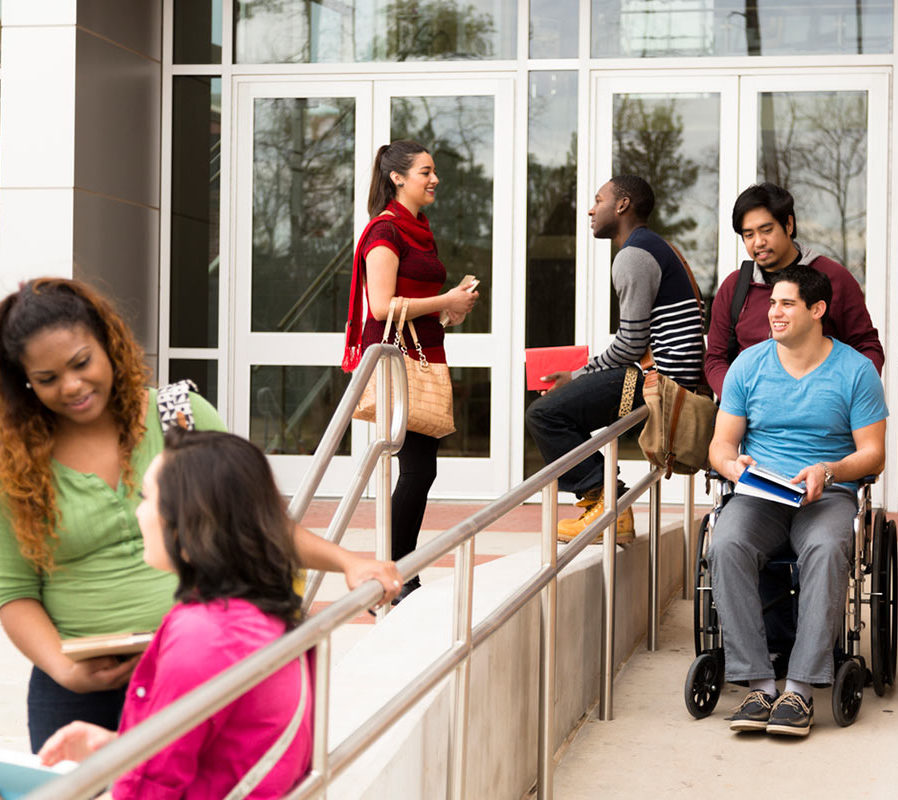Introduction
In post-secondary education, students with disabilities may receive a letter of accommodation that allows for academic adjustments to be made to help ensure an inclusive educational experience despite the barriers that exist. When a student has an official letter, based on the medical documentation they provided, educators have a duty to accommodate to the point of undue hardship. A duty to accommodate is related to human rights laws, and means that it is the responsibility of the educators to ensure inclusivity which allows the student to participate fully. However, amidst this obligation lies uncertainty regarding the definition of undue hardship. The following information will review the three considerations from the Ontario Human Rights Commission before claims of undue hardship can be warranted. Additionally, a review of the needs of meeting learning outcomes of a program are also discussed.
Considerations for Undue Hardship
Many who teach and work in post-secondary education have heard the sentence “Duty to accommodate to the point of undue hardship”. However, there is often confusion as to what is meant by the term undue hardship and at what point undue hardship is met when accommodating students with disabilities. The Ontario Human Rights Commission states that there are three considerations to assess to determine if undue hardship has been reached: cost, outside sources of funding, and health and safety requirements.
Costs
The standard through which costs would be considered too significant for accommodations to be provided is high. The costs to the organization need to be so substantial that they would alter the nature or affect the viability of the institution (Ontario Human Rights Commission, n.d.). In other words, this is not a matter of exceeding the budget of a department, but rather that it would create financial instability for the entire institution.
Outside Sources of Funding
If the accommodation is considered too costly for an organization, they are obligated to look for outside sources of funding to make the accommodation attainable. Undue hardship cannot be claimed unless outside and government funding have been exhausted.
Health and Safety
If an accommodation will likely cause significant health or safety risks to that student, to other students, or to the instructor, it may be considered undue hardship. When assessing the seriousness of the risk(s) to health and safety, after all precautions have been taken to mitigate the risk(s), the following should be considered: the nature of the risk, the severity of the risk, the probability of the risk, the reality of the risk, and the scope of the risk. Consideration is given to the increased number of people potentially harmed by the risk and the likelihood of the risk occurring. If the risk is due to the person’s conduct being disruptive, strategies to address this must be considered. Also, if a classroom or professor has ‘zero tolerance’ policies in place, they still need to accommodate a student with disabilities, as this is not considered reasonable for undue hardship.
Other Limitations to Accommodations
In post-secondary education there is also a need to consider the nature of the educational service. If a student’s accommodation would alter their ability to meet the learning outcomes of a course, if they cannot fulfill the essential duties of the course even after barriers have been removed, or if a student does not participate in the accommodation process, then there may be a reason to reconsider the accommodation. Before determining if this is the case, thought must be given to whether the requirement of the task is rationally connected to the purpose, if there is evidence to support that the requirement is essential, and if the requirement is constructed in a way that excludes or makes assumptions about a group of people (Centre for Innovation in Campus Mental Health, n.d.).
Summary/Key Takeaways
Given the criteria necessary to reach the point of undue hardship when accommodating students with disabilities, it is unlikely that an instructor will be put in the position of having to make this decision. What to consider when receiving accommodations for students is whether their accommodations will interfere with the learning outcomes of the course, and then attempt to find alternative solutions to meet those outcomes. When in doubt, feel free to reach out to your disability/accessibility services office at your campus, as they will surely be able to support both you and the student.



